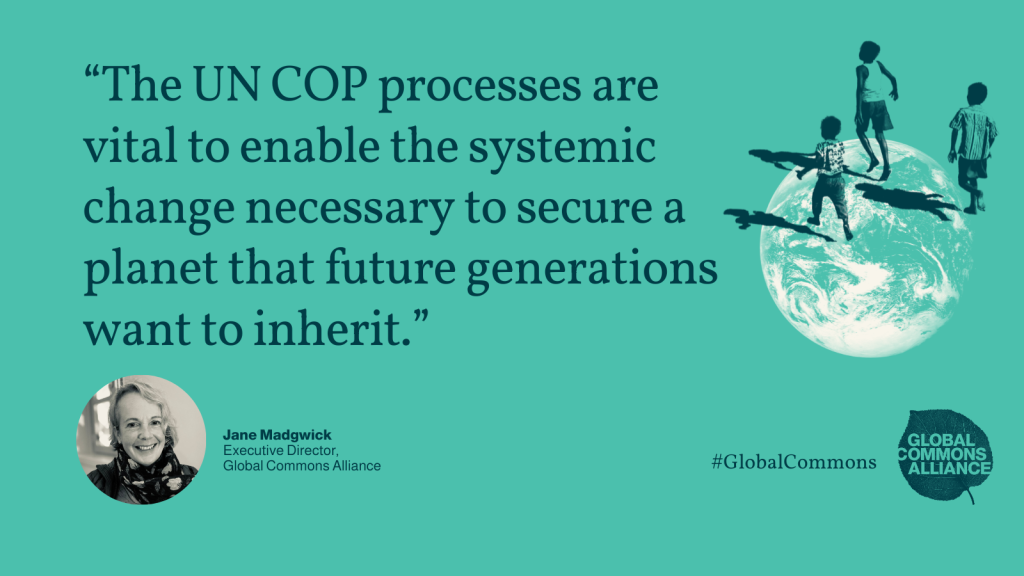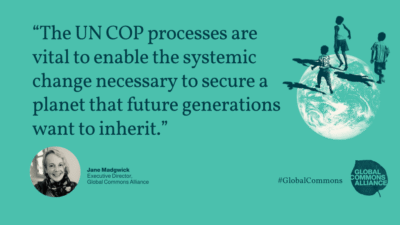What’s 1.5 billion hectares of land got to do with it?
27/11/2024
Below is the introduction to our latest newsletter. To read newsletters in full, sign up now or subscribe on Linkedin.
Dear Planetary Steward, dear friend of the Global Commons Alliance,
This week the final round of negotiations for a Global Plastics Treaty (INC-5) began in Busan, Korea. Last year talks ended with no agreement to cut plastic pollution. Since then, 220 million tonnes of plastic is estimated to have been produced. This year, following the momentum of last week’s COP29, the outcome may be different. Despite fears the US election would stall the climate talks, the nearly 200 countries gathered in Baku reached a breakthrough agreement to triple climate finance for developing countries—from US$100 billion to $300 billion a year—and to secure efforts to scale this up to US$1.3 trillion a year with public and private funds, by 2035.
While this is not sufficient for vulnerable countries—the deal was labeled a “death sentence” for billions by some, and India called it a “paltry sum”—it is a vital first step from discussions that were at some point close to collapsing. Progress was also seen outside of the main texts. There was a long-awaited agreement on a centralized science-based carbon market, which will benefit developing countries, as well as the launch of a 12-country Global Clean Power Alliance. Brazil, the UK and the UAE announced progressive new climate targets. Mexico set a new net zero target, Indonesia announced it will phase out fossil-fuel power generation, and a coalition of 30 countries endorsed a declaration to reduce methane from organic waste.

However, we can’t brush over the fact that both the fossil fuel transition and nature were neglected. Last week I signed a public joint-statement organized by Nature4Climate along with more than 100 NGOs and business coalitions calling for COP29 to recognize nature. We stressed: “There is no viable climate or economic solution without nature.”
This makes next week’s COP16 of the UN Convention to Combat Desertification (UNCCD) in Riyadh, Saudi Arabia more important than ever. UNCCD is one of the three major UN treaties known as the Rio Conventions, alongside climate and biodiversity. This final but just as crucial conference for the year has moved its focus from just desertification to overall land degradation, including biodiversity, peoples’ livelihoods and better management of land and resources. With an aim to restore 1.5 billion hectares of land by 2030, we will be following discussions closely as actors including finance and local communities are brought together. Erin Billman, Executive Director of SBTN will be opening discussions on Land Day, about how land restoration can unite global climate and biodiversity goals.
It’s easy to dismiss the UN processes as slow and dysfunctional, and there were strong calls for reform issued during COP29. But they are vital to enable the systemic change necessary to secure a planet that future generations want to inherit. In the year leading up to COP30 in Belem, Brazil, the Global Commons Alliance will continue to work with its increasingly diverse partners to accelerate collaboration at all scales, and to connect global and local action, amplifying solutions. From climate to biodiversity and land, humanity can safeguard the global commons if we put aside our differences for the greater good.
All my best,
Jane
Subscribe on email or Linkedin to get our bi-weekly newsletter.
